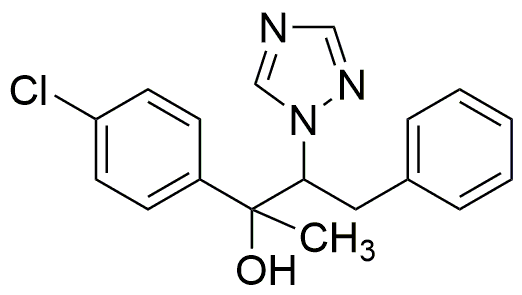Brassinazole is widely utilized in research focused on:
- Agriculture: This compound is used as a plant growth regulator, enhancing crop yield and stress resistance. It helps in improving the quality of fruits and vegetables by promoting better growth under adverse conditions.
- Phytochemistry: Researchers employ brassinazole to study plant hormone interactions, particularly its role in inhibiting brassinosteroid biosynthesis, which is crucial for understanding plant development and physiology.
- Biotechnology: In genetic engineering, it serves as a tool to modify plant traits, enabling the development of genetically modified organisms (GMOs) with desirable characteristics such as increased resistance to pests and diseases.
- Pharmaceuticals: The compound is being explored for its potential medicinal properties, particularly in the development of new drugs that target specific plant-related diseases, which can be beneficial for agricultural health.
- Environmental Science: Brassinazole is studied for its effects on plant responses to environmental stressors, providing insights that can lead to more sustainable agricultural practices and improved crop resilience to climate change.
General Information
Properties
Safety and Regulations
Applications
Brassinazole is widely utilized in research focused on:
- Agriculture: This compound is used as a plant growth regulator, enhancing crop yield and stress resistance. It helps in improving the quality of fruits and vegetables by promoting better growth under adverse conditions.
- Phytochemistry: Researchers employ brassinazole to study plant hormone interactions, particularly its role in inhibiting brassinosteroid biosynthesis, which is crucial for understanding plant development and physiology.
- Biotechnology: In genetic engineering, it serves as a tool to modify plant traits, enabling the development of genetically modified organisms (GMOs) with desirable characteristics such as increased resistance to pests and diseases.
- Pharmaceuticals: The compound is being explored for its potential medicinal properties, particularly in the development of new drugs that target specific plant-related diseases, which can be beneficial for agricultural health.
- Environmental Science: Brassinazole is studied for its effects on plant responses to environmental stressors, providing insights that can lead to more sustainable agricultural practices and improved crop resilience to climate change.
Documents
Safety Data Sheets (SDS)
The SDS provides comprehensive safety information on handling, storage, and disposal of the product.
Product Specification (PS)
The PS provides a comprehensive breakdown of the product’s properties, including chemical composition, physical state, purity, and storage requirements. It also details acceptable quality ranges and the product's intended applications.
Certificates of Analysis (COA)
Search for Certificates of Analysis (COA) by entering the products Lot Number. Lot and Batch Numbers can be found on a product’s label following the words ‘Lot’ or ‘Batch’.
*Catalog Number
*Lot Number
Certificates Of Origin (COO)
This COO confirms the country where the product was manufactured, and also details the materials and components used in it and whether it is derived from natural, synthetic, or other specific sources. This certificate may be required for customs, trade, and regulatory compliance.
*Catalog Number
*Lot Number
Safety Data Sheets (SDS)
The SDS provides comprehensive safety information on handling, storage, and disposal of the product.
DownloadProduct Specification (PS)
The PS provides a comprehensive breakdown of the product’s properties, including chemical composition, physical state, purity, and storage requirements. It also details acceptable quality ranges and the product's intended applications.
DownloadCertificates of Analysis (COA)
Search for Certificates of Analysis (COA) by entering the products Lot Number. Lot and Batch Numbers can be found on a product’s label following the words ‘Lot’ or ‘Batch’.
*Catalog Number
*Lot Number
Certificates Of Origin (COO)
This COO confirms the country where the product was manufactured, and also details the materials and components used in it and whether it is derived from natural, synthetic, or other specific sources. This certificate may be required for customs, trade, and regulatory compliance.


